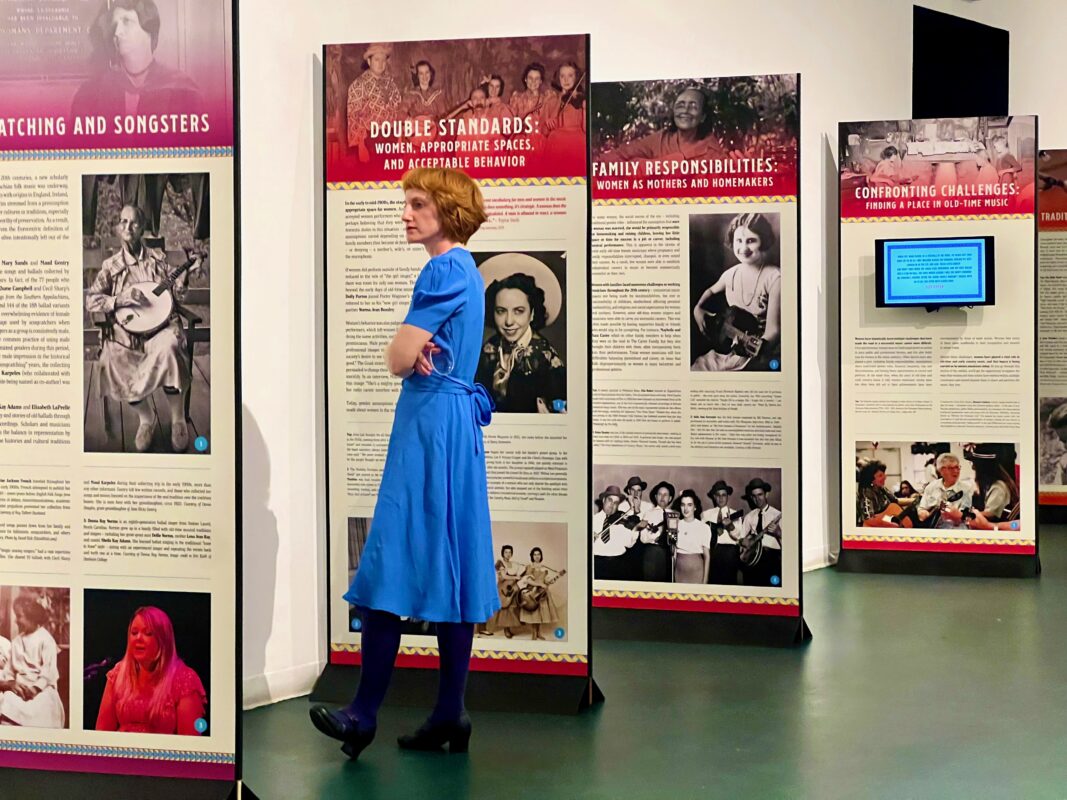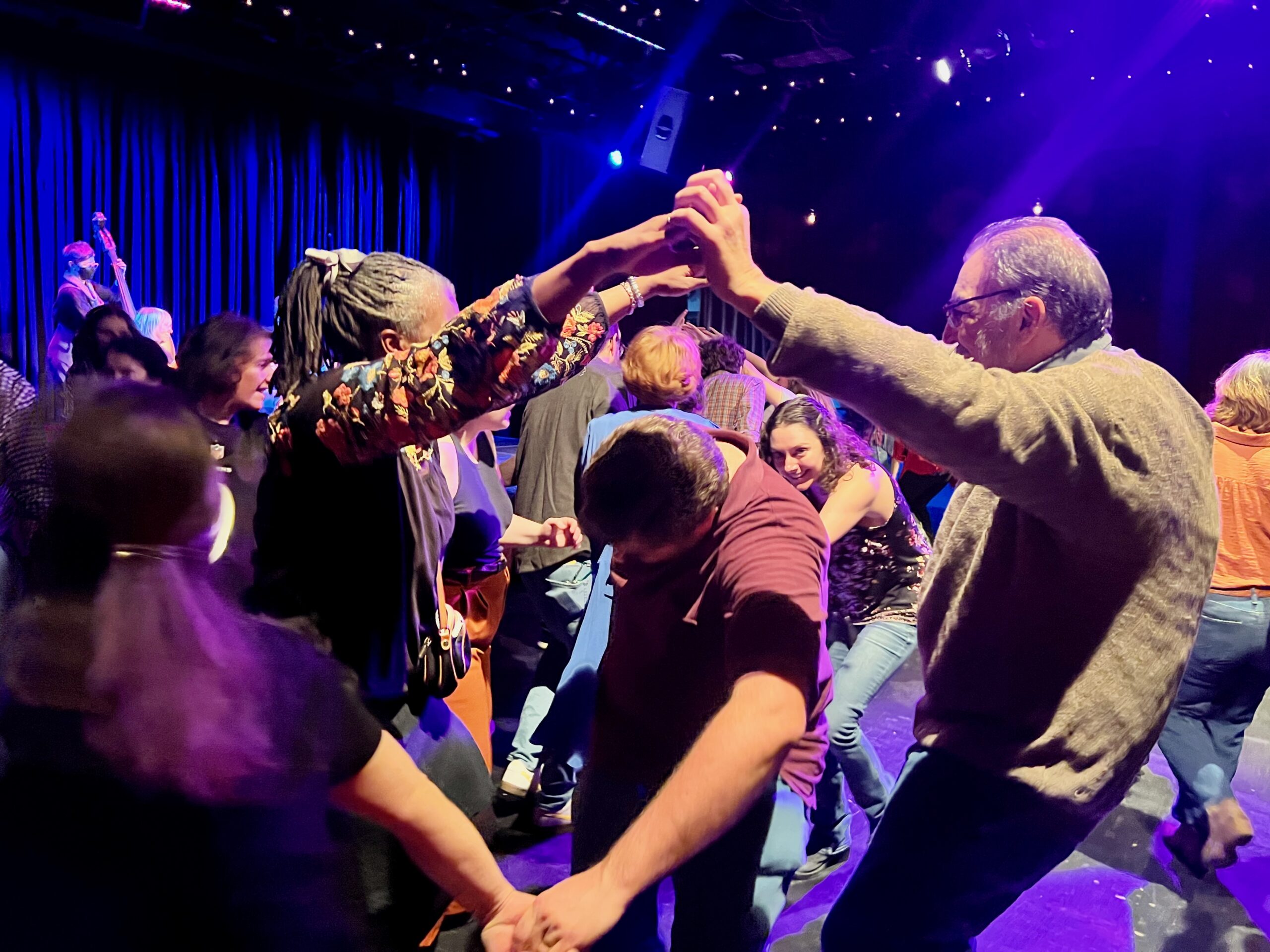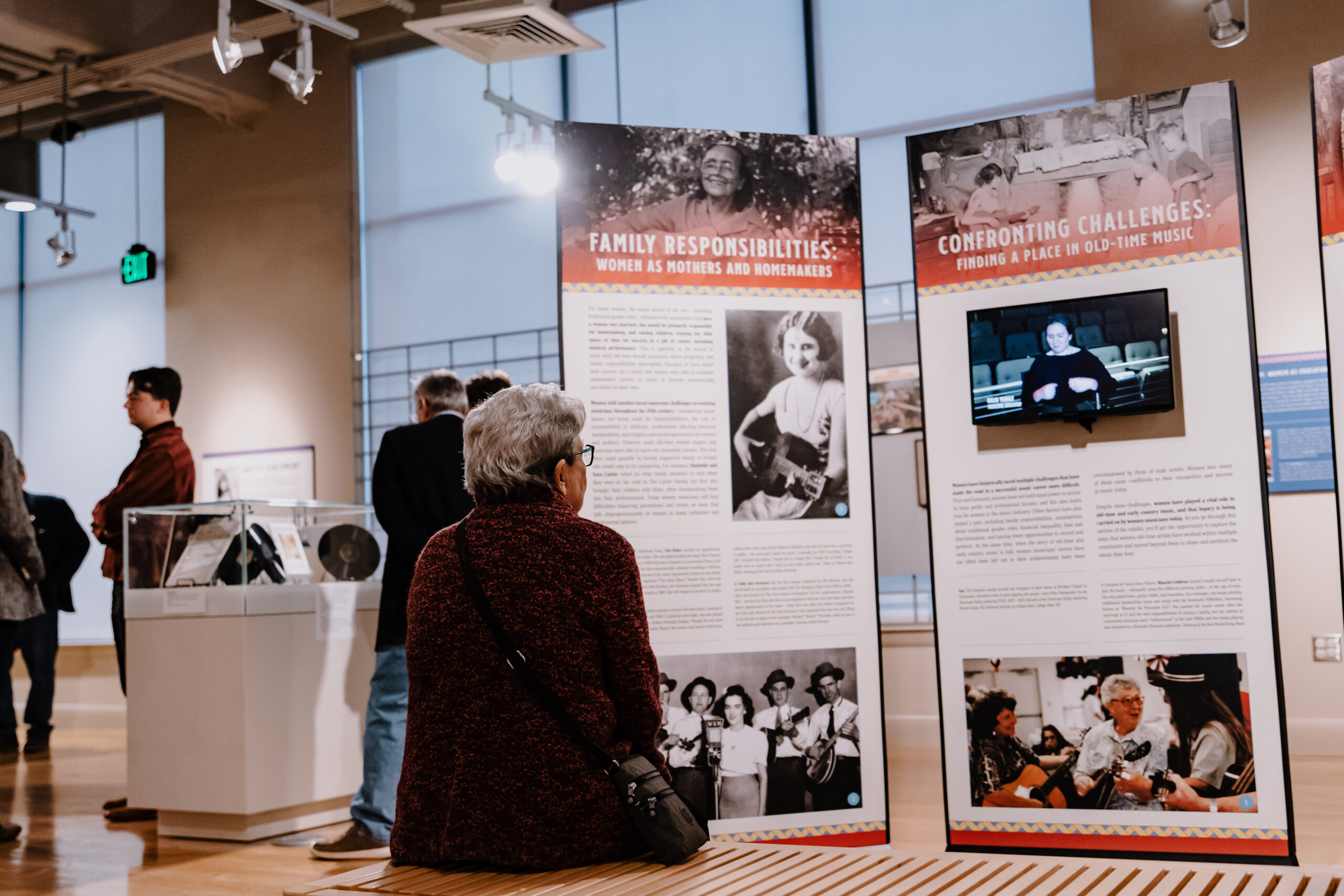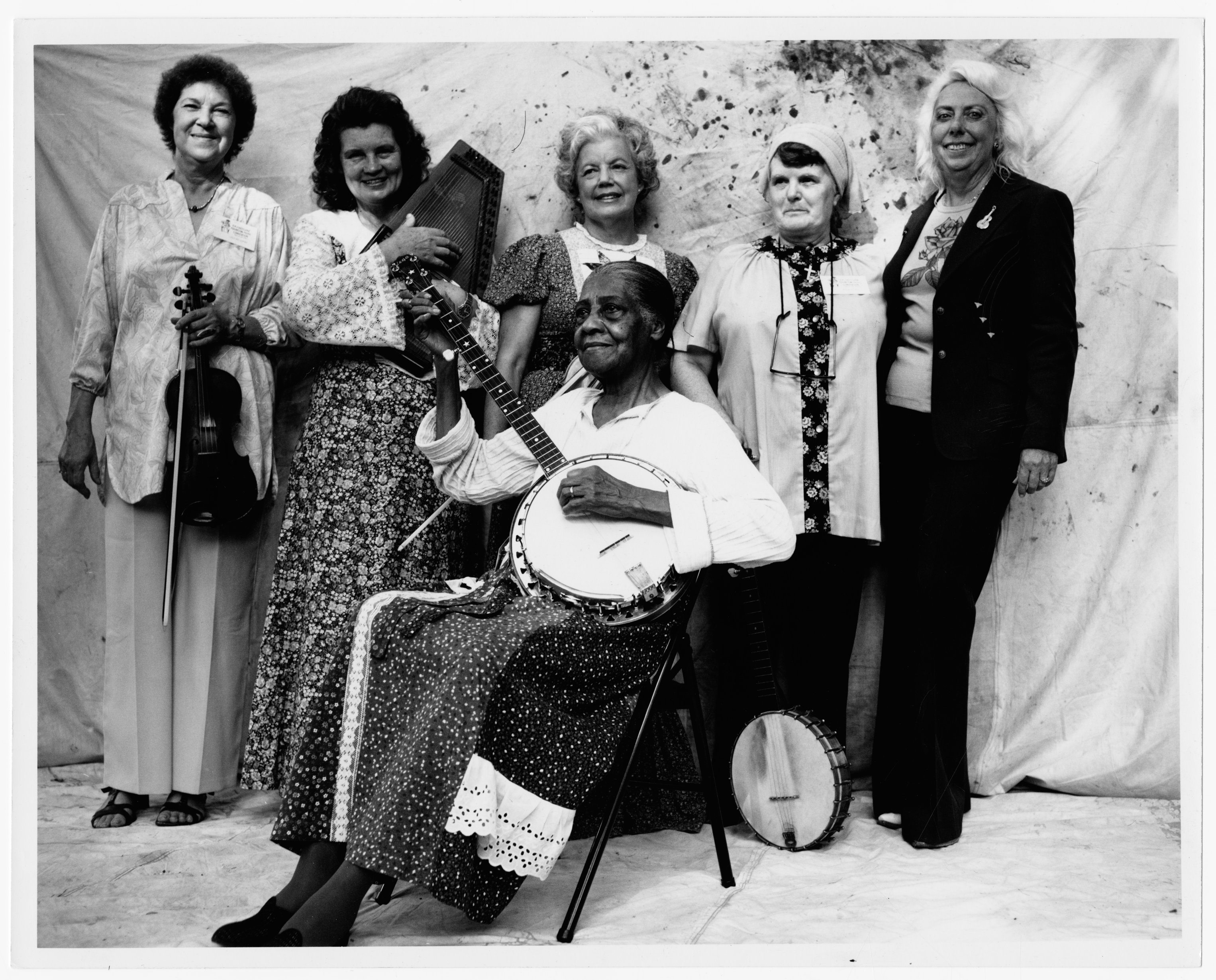
For one weekend only, the perennial sounds of old-time and Americana music will echo through Highlandtown’s Creative Alliance as the inaugural Say Sister! Festival honors women’s lasting influence on the genre.
Curated in part by two-time Grammy-winning Maryland artists Cathy Fink and Marcy Marxer, the fest celebrates a rare collaboration with the Birthplace of Country Music Museum in Bristol, Tenn., bringing Baltimore folk fans a special opportunity to experience live music and workshops from some of today’s most knowledgeable performers and teaching artists January 10-11.
The festival kicked off last weekend with a high-energy square dance led by Appalachian-style caller Becky Hill and Fink and Marxers’s Old Time Coalition, featuring fiddle player Rachel Eddy. Participants of all ages gathered to swing their partners in time, while banjo tunes bounced through the theater.
Attendee Joyleen John-Sowah said she decided to attend the festival when she learned there would be dancing. “I can dance to anything,” she said with a beaming smile. “And if you’re going to make me listen to old-time music—I better be able to dance.”

John-Sowah’s humor captures the spirit of the folk tradition perfectly: The genre is meant to be experienced, passed down mostly orally, or at the very least, in a participatory way with lots of dancing along.
Kristina Gaddy, the Baltimore-based author of Well of Souls: Uncovering the Banjo’s Hidden History, attended the Jan. 3 square dance and said that Fink and Marxer have been “so amazing about supporting young artists, women and non-binary artists, artists of color, and queer artists.”
Last weekend was also the official opening of the festival’s centerpiece, an exhibit entitled, I’ve Endured: Women in Old-Time Music—which affirms the inclusive ethos that Gaddy mentions.
On display through March 1 in the Creative Alliance’s main gallery, the installation spotlights the untold stories of women who shaped folk music and recognizes the work still left to be done to give credit where it’s due. Fink, who co-curated the exhibit, said on Instagram, “I’m so excited that we got to highlight people whose voices have been a little underheard through the years.”

On loan from the Birthplace of Country Music Museum, I’ve Endured is named after the song by Ola Belle Reed, a North Carolina musician whose timeless croon and poignant ballads defined mountain music. Each panel in the exhibit highlights the roles women play as performers, cultural memory keepers, and innovators, while pushing back against the male-dominated narratives that often overshadow their impact.
This conversation is especially relevant today, when the national dialogue about the origins of Americana music is up for review. (Look no further than Beyoncé’s Country Music Award snub in 2024, which invited long-overdue reflection on the erasure of country music’s earliest contributors.)
Yes, folk music—rooted in oral traditions—has always evolved by the hands of the people sharing it outside the recording studio. Icons like the left-handed virtuoso Elizabeth Cotten, who gave us “Freight Train” in two-finger picking style, and legendary guitarist Etta Baker, who shared Piedmont-style blues with the world, continue to live on in the music of today’s top artists. Harry Smith’s Anthology of American Folk Music, published in 1952 by the Smithsonian Institute, may have codified the canon, but artists like those featured in this weekend’s exhibit were the ones who birthed and nourished it.

Come see for yourself: The festival’s lineup this weekend features a stacked roster of musicians from up and down the Eastern Seaboard and into Southern Appalachia. Attendees can expect performances by Grammy-nominated Amythyst Kiah, three-time National Fiddle Champion and Della Mae member Kimber Ludiker, and champion-winning dulcimer player Sarah Kate Morgan.
Workshops on Appalachian dulcimers, clawhammer banjo, and flatfoot dancing will take place all day on Saturday. In addition, Dr. Dena Ross Jennings, a Virginia-based artist with Appalachian roots stretching back five generations, will craft a traditional gourd banjo to be auctioned off on Saturday evening.
“Organizing this festival and exhibition has been an inspiring journey,” says Creative Alliance performance director Tinku Bhattacharyya, whose background in artist management led her from the U.K. to New York City before landing in Baltimore, where she says learning about Americana music through Fink and Marxer’s curation “feels especially meaningful.”
In her 1970s recording of “Undone in Sorrow” Ola Belle Reed asks, “Can I do a song that is as old as the hills and has the oldest flavor?” She warns facetiously, “It’s a sad, sad, sad, mournful song—when I get done with it, it’ll be pitiful.”
After a weekend at Say Sister!, you won’t feel pitiful—but you might never hear Americana music the same way again.
Here’s a rundown of highlights to help you plan your weekend:
Friday, Jan. 10: A Night of Americana Excellence
The festival’s long-awaited performance series begins in the Creative Alliance theater at 7 p.m. sharp. The evening’s stellar lineup includes Grammy-nominated, Tennessee-born artist Amythyst Kiah, whose bold stage presence and genre-defying sound captivate audiences; National Mountain Dulcimer Champion Sarah Kate Morgan, who shares the rich Appalachian tradition through story-driven lyrics and lively instrumentals; three-time National Fiddle Champion Kimber Ludiker, founder of the Grammy-nominated band Della Mae; two-time Grammy winners Cathy Fink & Marcy Marxer, who deliver their signature harmonies and mastery of guitar, banjo, and ukulele; and Ann Porcella, whose gospel-rooted voice evokes deep emotion.
Tickets are $30 for general admission, $25 for members, and $20 for youth under 16.
Saturday, Jan. 11: Workshops, Discussions, and the Grand Finale
The festival’s second day delivers a jam-packed schedule of hands-on workshops, thought-provoking discussions, and spirited concerts celebrating old-time music.
Workshops (10 a.m. to 5 p.m.):
Start the day by learning from the pros. Kimber Ludiker’s 10 a.m. fiddle workshop will focus on Northwest-style, old-time tune and bowing techniques. At the same time, Sarah Kate Morgan’s dulcimer class will hone strumming patterns and melody creation for all skill levels. At 11:30 a.m., Ludiker will switch to mandolin to teach rhythm playing for classic fiddle tunes in D and G, while Marcy Marxer shares Elizabeth Cotten’s fingerstyle guitar technique, including “Oh Babe, It Ain’t No Lie.”
After lunch at 1 p.m., Cathy Fink will dissect “Cripple Creek,” teaching more than 18 clawhammer banjo variations. Then at 2:30 p.m., Becky Hill will turn fiddle tunes into flatfoot choreography. Closing out the day at 4 p.m., Meghan Mette will offer a three-part version of “Cumberland Gap” on clawhammer banjo, tuned in double C.
Workshop tickets range from $60 for two sessions to $200 for the full VIP experience.
Discussions (11:30 a.m. to 2 p.m.):
In the Marquee Lounge, sit in on conversations pairing live demonstrations with history. At 11:30 a.m., featured artists Amythyst Kiah, Sarah Kate Morgan, and Cathy Fink will discuss shaping traditional songs into new works. At 1 p.m., Lillian Werbin and Dena Ross Jennings will discuss the African-American roots of old-time music and draw connections from the banjo’s origins to contemporary practice.
Free Activities (all day):
As if there wasn’t enough to keep you busy, throughout the day, festival-goers can also enjoy singalongs, films, and live demos. The Hazel Dickens and Alice Gerrard Singalong at 10 a.m. invites participants to belt out classics alongside Cathy Fink, Marcy Marxer, and Ann Porcella. At 1 p.m., a documentary screening of I’ve Endured will explore Ola Belle Reed’s influence, followed by a concert celebrating her work. Dr. Dena Ross Jennings will demonstrate gourd banjo building from 10 a.m. to 4 p.m., capping things off with an auction of the finished instrument.
Saturday Night Supergroup Finale (8 p.m.):
The festival closes with this one-of-a-kind collaborative performance. Expect lively duets, intricate harmonies, and a showcase of homegrown talent featuring Amythyst Kiah, Kimber Ludiker, Sarah Kate Morgan, and Ann Porcella. Trust us—you’ll want to be there.
Tickets for the finale are $35 for general admission, $30 for members, and $20 for youth under 16.
Through March 1: I’ve Endured: Women in Old-Time Music
Though there’s so much to see and do, don’t forget to devote some time to the festival’s centerpiece exhibit, which is free and open to the public throughout festival hours in the Creative Alliance main gallery. On loan from the Birthplace of Country Music Museum in Bristol, Tenn., it highlights women’s often-overlooked contributions to old-time music and features archival photos, artifacts, and art inspired by their legacies.
